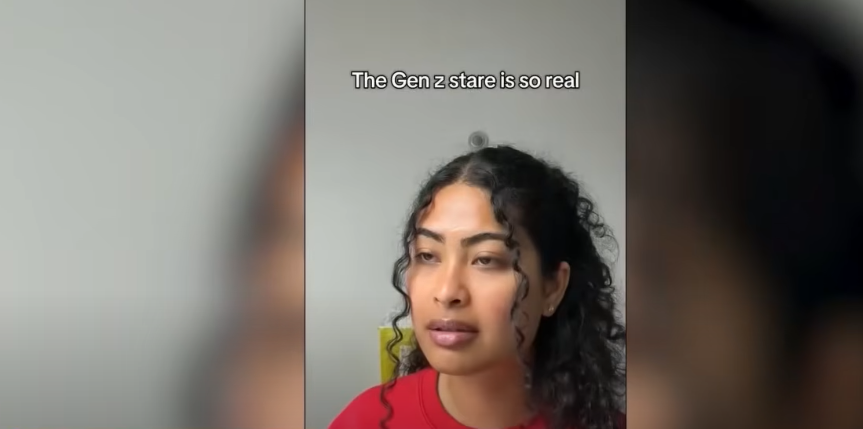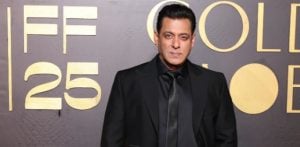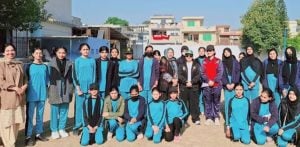“The young person working at the counter just stared blankly"
The ‘Gen Z Stare’ is more than just another TikTok trend; it’s fast becoming a source of real tension in offices, cafés, and customer service counters around the world.
What began as a viral joke is now turning into a workplace concern, sparking debates about communication, professionalism, and the future of soft skills.
If you’ve ever had an awkward encounter where a young employee simply stared back at you in silence, you may have already experienced it.
This expressionless, almost vacant gaze has become a trademark among many Gen Zers, those born between 1997 and 2012, and it’s leaving some older colleagues confused, frustrated, or downright uncomfortable.
Unlike other TikTok trends that poke fun at the world, the Gen Z stare flips the camera back on the generation itself.
And while it may seem like a harmless quirk, employers and hiring managers are starting to take notice, not for the better.
In industries where interpersonal interaction is key, the rise of this silent, unresponsive communication style is raising red flags.
The Gen Z stare has become a symbol of generational friction, reflecting deeper changes in the labour market and pushing companies to rethink how they train, retain, and even recruit young talent.
As we explore this phenomenon, the spotlight is firmly on how a TikTok-fuelled trend is clashing with traditional workplace expectations and why this silent stare might be costing Gen Z more than just a few raised eyebrows.
What is the Gen Z Stare?

At its core, the Gen Z stare refers to a blank, unbothered facial expression, one that often replaces greetings, small talk, or even basic verbal responses.
It’s become especially visible in service roles, where customer interaction is central.
For those unfamiliar, it can feel jarring, even disrespectful.
A Reddit user recently shared their experience in a chocolate shop:
“The young person working at the counter just stared blankly at me as I smiled and said ‘Hi!’
“She said nothing, even when I said thank you after the interaction. It makes me self-conscious. I start wondering if I did something wrong.”
The trend has gained traction across TikTok, where Gen Z users parody their own deadpan expressions, sparking both laughs and backlash.
But the backlash isn’t confined to the internet.
Older generations, particularly millennials and Gen X, have taken to platforms like Reddit to question the behaviour. The common complaint? A perceived lack of soft skills and human connection.
But many Gen Zers argue that the stare is a conscious rejection of forced pleasantries or awkward social scripts.
Some say it’s a response to unrealistic customer expectations or the emotional labour of maintaining a cheerful façade. In their view, the stare is about authenticity, not apathy.
The Workplace Impact

While debates rage online, the consequences of the Gen Z stare are increasingly being felt in the workplace.
Managers across industries report rising challenges with soft skills among younger employees, particularly around face-to-face communication.
This has real business implications.
For example, in retail and hospitality, positive customer interactions are vital.
A disengaged or unreadable expression can lead to misunderstandings, reduced customer satisfaction, and even lost business.
Some companies are ramping up investment in soft skills training for Gen Z workers, which increases onboarding time and costs.
The issue isn’t just limited to customers. Team cohesion is also at risk.
Half of managers say Gen Z workers create friction with older staff. Eighteen per cent of managers have considered quitting over the difficulty of managing Gen Z employees, while 27% admit they would prefer not to hire them if possible.
Even Gen Z managers agree, with many finding that their own generation is the hardest to manage.
As a result, the Gen Z stare is a symbol of a wider disconnect between young workers and traditional workplace expectations.
Managerial Fatigue

The Gen Z stare is often interpreted as apathy or even passive-aggression but that may not always be the intent.
Many young workers feel anxious, overstimulated, or simply uncertain about how to act in high-pressure or unfamiliar social situations.
But for older colleagues, this blank expression reads as a lack of engagement or effort.
That misalignment creates a cycle of misunderstanding.
Managers expect initiative and warmth. Employees expect clarity and authenticity. When neither gets what they expect, frustration grows.
And the effect on managers is measurable.
As businesses attempt to integrate a digitally native generation into roles that still rely on emotional intelligence and human warmth, many are finding themselves burnt out. For some, the extra effort required to bridge the communication gap simply isn’t worth it.
This exhaustion is more than anecdotal.
Surveys suggest a significant number of middle managers feel unequipped to manage the interpersonal gaps emerging between Gen Z and other age groups.
It’s yet another layer of strain in an already stressed workplace environment.
The Hiring Gap and Its Economic Implications

The Gen Z stare also highlights a broader challenge in the job market.
As the youngest working generation, Gen Z faces a labour landscape shaped by automation, AI disruption, and a fading “safety premium” attached to university degrees.
The competition is fiercer than ever but the demand for soft skills has never been higher.
Yet around 58% of recent graduates are still looking for full-time work, more than double the rate of millennials or Gen X at the same age.
They’re three times less likely to have a job lined up post-graduation.
At the same time, companies are trimming back entry-level roles, particularly in sectors hit hardest by automation and AI.
In this climate, every interview, every internship, every first impression counts.
And a blank stare, even if unintentional, can be the difference between landing a job and missing out.
Many recruiters now assess candidates heavily on interpersonal engagement and “cultural fit”.
If Gen Z’s communication style is perceived as cold, distant or unreadable, it could limit their chances, regardless of qualifications.
In short, the stare might be undermining their job prospects before they even get started.
A Mirror of the Past?

Of course, every generation has endured its share of criticism.
Millennials were slammed for being self-absorbed and overly sensitive. Gen X was labelled cynical and emotionally distant.
These broad generational generalisations tend to ignore nuance and context, and they often say more about the critics than the criticised.
Still, the Gen Z stare feels different because it plays out so publicly, not just in the workplace but on social media feeds, viral videos, and HR reports.
The internet hasn’t just amplified the trend; it’s magnified its consequences.
What’s more, the economic pressures facing Gen Z are uniquely acute.
Soaring housing costs, stagnant wages, and a dwindling number of secure jobs mean that success is harder to come by.
It’s no wonder some young workers are disillusioned, but the way that disillusionment manifests could be closing doors, not opening them.
The Gen Z stare might have started as a TikTok trend, but it’s now a visible fault line in the workplace.
It has become a symptom of a wider generational divide shaped by economic uncertainty, digital culture, and evolving social norms.
While Gen Z may see the stare as a mark of authenticity, many employers see it as a red flag.
In a competitive job market, where first impressions carry increasing weight, this blank expression could be holding young professionals back.
Businesses must adapt, through training, clearer expectations, and empathy, but Gen Z workers also need to recognise the value of soft skills.
Authenticity is important, but so is adaptability.
In a world that still values warmth, engagement and initiative, silence can speak volumes, and not always in your favour.






























































